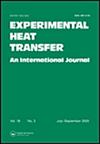Experimental investigation on heat transfer characteristics of upward flow boiling in a vertical narrow rectangular channel
IF 2.9
3区 工程技术
Q2 ENGINEERING, MECHANICAL
引用次数: 0
Abstract
Heat transfer experiment on water flow boiling was carried out in the upward direction under atmospheric pressure through a narrow rectangular channel heated on one-side by vapor having a gap of 2.75 mm, a width of 250 mm, and length of 1400 mm. The heat transfer coefficient and thermal hydraulic thresholds of the flow boiling in forced convective flow, such as the onset of nucleate boiling (ONB) and onset of fully developed nucleate boiling (OFDB) were investigated. The experiment was performed over a wide range of inlet temperature (75–95°C), mass flow rate (2–9 g/m), and heat fluxes (5–16 kW/m2). The effects of the parameters on the heat transfer coefficients have been discussed in detail. A series of ONB, FDB and heat transfer correlations were evaluated using the experimental data, and most of the correlations did not adequately fit the experimental results. A modified Hong et al. correlation and modified Zhu et al. correlation were used to predict the wall superheat at ONB and FDB respectively. The average errors (AEs) of the two correlations were 2.36% and −0.68%, and the root mean square errors (RMSEs) of them were both 14.00%. A modified Li and Wu correlation was used to predict heat transfer coefficients with the average error (AE) of 1.46% and the root mean square errors (RMSE) of 11.88%.垂直窄矩形通道内向上流动沸腾换热特性的实验研究
在常压下,通过一侧被蒸汽加热的窄矩形通道进行了向上流动沸腾的换热实验,通道的间隙为2.75 mm,宽度为250 mm,长度为1400 mm。研究了强制对流流动沸腾的传热系数和热水力阈值,如核沸腾起始(ONB)和核沸腾完全发育起始(OFDB)。实验在较宽的进口温度(75-95℃)、质量流量(2-9 g/m)和热流(5-16 kW/m2)范围内进行。详细讨论了传热参数对传热系数的影响。利用实验数据计算了一系列的ONB、FDB和换热相关性,发现大部分相关性不能充分拟合实验结果。采用修正的Hong等相关性和修正的Zhu等相关性分别预测ONB和FDB的壁面过热度。两种相关性的平均误差(ae)分别为2.36%和- 0.68%,均方根误差(rmse)均为14.00%。采用修正的Li和Wu相关预测换热系数,平均误差(AE)为1.46%,均方根误差(RMSE)为11.88%。
本文章由计算机程序翻译,如有差异,请以英文原文为准。
求助全文
约1分钟内获得全文
求助全文
来源期刊

Experimental Heat Transfer
工程技术-工程:机械
CiteScore
6.30
自引率
37.10%
发文量
61
审稿时长
>12 weeks
期刊介绍:
Experimental Heat Transfer provides a forum for experimentally based high quality research articles and communications in the general area of heat-mass transfer and the related energy fields.
In addition to the established multifaceted areas of heat transfer and the associated thermal energy conversion, transport, and storage, the journal also communicates contributions from new and emerging areas of research such as micro- and nanoscale science and technology, life sciences and biomedical engineering, manufacturing processes, materials science, and engineering. Heat transfer plays an important role in all of these areas, particularly in the form of innovative experiments and systems for direct measurements and analysis, as well as to verify or complement theoretical models.
All submitted manuscripts are subject to initial appraisal by the Editor, and, if found suitable for further consideration, to peer review by independent, anonymous expert referees. All peer reviews are single blind and submission is online via ScholarOne Manuscripts. Original, normal size articles, as well as technical notes are considered. Review articles require previous communication and approval by the Editor before submission for further consideration.
 求助内容:
求助内容: 应助结果提醒方式:
应助结果提醒方式:


